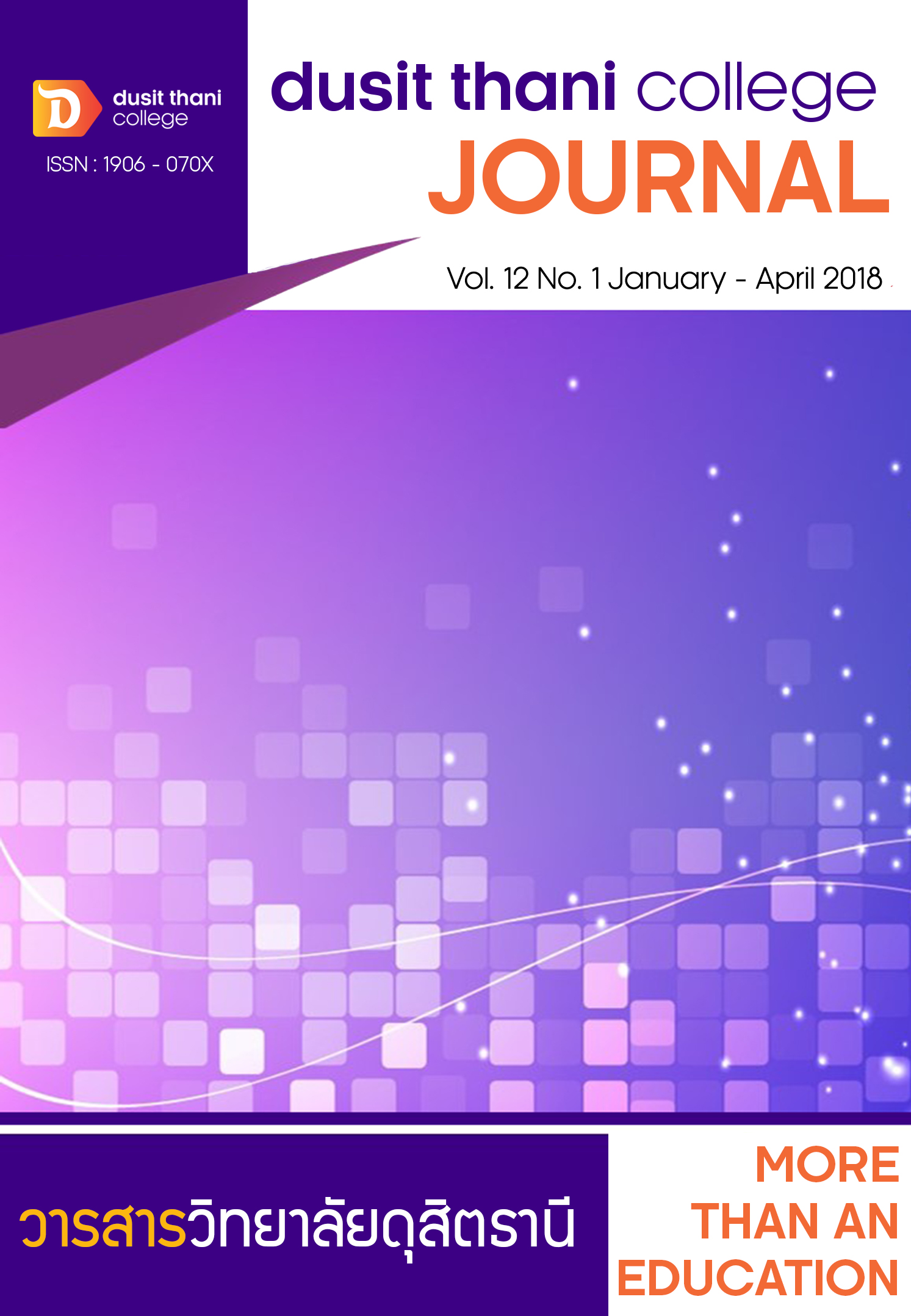Airline's Roles for Supporting Sustainable Tourism Development
Main Article Content
Abstract
Globally, the increasing number of tourists has been evidenced. This paper aims to investigate the important roles of airlines in supporting the development of sustainable tourism. The aviation industry is considered as a main engine driving global tourism industry. Air travel is the preferred transportation option for most of tourists with an aim of recreational purpose. Although the tourism industry is a major contributor to national revenue, its adverse impacts on tourist sites has been seen. It is recognized that the tourism industry has directly and indirectly, positively and negatively economic, social and environmental impacts from the actions of tourism stakeholders such as airlines, airline passengers, local entrepreneurs, and local people. The Airline should have a role in creating awareness and willingness to both airline administrative and airline passengers to support the sustainable tourism development in 3 dimensions: economic, social and environment.
Article Details
Article Screening Policy
- All research and academic articles to be published must be considered and screened by three peer reviews in the relevant field / article.
- All articles, texts, illustrations and tables published in the journal are the personal opinions of the authors. Editors don't always have to agree. And no responsibility whatsoever is the sole responsibility of the author.
- The articles to be published must never be published. Where did you first publish? And not in the consideration of other journals If the audit found that there has been a duplicate publication It is the sole responsibility of the author.
- Any article that the reader sees as being plagiarized or impersonated without reference. Or mislead the work of the author Please let the journal editor know it will be your greatest blessing.
References
Becken, S. (2002). Analysing International Tourist Flows to Estimate Energy Use Associated with Air Travel. Journal of Sustainable Tourism.
Buckley, R. (1996). Sustainable tourism: Technical issues and information needs. Annals of Tourism Research. l.23(1): 925-928
Byrd, E.T., Bosley, H. E. and Dronberger, M.G. (2009), Comparisons of stakeholder perceptions of tourism impact in rural eastern North Carolina. Tourism Management. 30.
Cohen, J.M., and Uphoff, N.T. (1980). 'Participation's place in rural development: Seeking clarity through specificity', World Development. 8: 213-235.
Conaghan, A. and Hanrahan, J. (2009). Global Conformity of Indicators for Eco-Certification Programs. Tourism and Hospitality Research in Ireland Conference: Dublin Institute of Technology.
Elkington, John. (1994). Towards the Sustainable Corporation: Win-Win-Win Business Strategies for Sustainable Development. California Management Review. 36(2): 90–100.
Endsley, R. Mica. (1995). Toward a Theory of Situation Awareness in Dynamic Systems. Human Factors. 37(1): 32-64.
European Commission. (2014). Climate Action. Retrieved 05 February 2017 from
https://ec.europa.eu/clima/policies/ets/index_en.htm
Fennell, D. (2003). Ecotourism: An introduction. Routledge, London.
Hagmann, C., Semeijn, J., and Vellenga, D. B. (2015). Exploring the green image of airlines: Passenger perceptions and airline choice. Journal of Air Transport Management. 43: 37-45
Higham, J., Cohen, S. A., Cavaliere, C. T., Reis, A. and Finkler, W. (2016). Climate change, tourist air travel and radical emissions reduction. Journal of Cleaner Production
111: 336-347
Honey, M. (1999). Ecotourism and sustainable development: Who owns paradise? Washington DC: Island Press.
Inskeep, E. (1987). Environmental planning for tourism. Annals of Tourism Research. 14: 118-135
International Air Transport Association (IATA). (2015). Press Releases. Press Release No.: 55 26 November 2015. Retrieved 05 February 2017 from https://www.iata.org/pressroom/pr/Pages/2015-11-26-01.aspx
International Civil Aviation Organization (ICAO). (2012). Global Aviation and Our Sustainable Future. P.6 Retrived 09 February 2017 from https://www.icao.int/environmental-protection/Documents/RIO+20_booklet.pdf
Jamieson, W. (2001). Sustainable Tourism and Development: Principles and Practices. Bangkok: Asain Institute of Technology.
Kannapa, Pongponrat and Soparth, Pongquan. (2007). Community Participation in a Local Tourism Planning Process: A Case Study of Nathon Community on Samui Island, Thailand. Asia-Pacific Journal of Rural Development. 18(2).
Lim, T. Y. (2012). Designing the next generation of mobile tourism application based on situation awareness. Southeast Asian Network of Ergonomics Societies Conference (SEANES): Langkawi, Kedah. pp. 1-7.
Mak, B. L. and Chan, W. W. (2007). A Study of Environmental Reporting: International Japanese Airlines, Asia Pacific. Journal of Tourism Research. 12(4): 303-312.
Ozbay, K., Ozmen-Ertekin, D. and Berechman, J. (2003). Empirical analysis of relationship between accessibility and economic development. Journal of Urban Planning and Development. 129(2).
Page, S. and Lumsdon, L. (2004). Tourism and transport: Issues and agenda for the new millennium. Boston: Elsevier.
Qantas Airways. 2015. Sustainable Tourism. Retrieved February 05, 2017 from https://qantas2015.reportonline.com.au/
Quintano, C., Pagliuca, M. M. and Rosciano, M. (2011). Comparisons of Stakeholder Perceptions of Sustainable Tourism in Naples: Sustainable Tourism: Socio-Cultural, Environmental and Economics Impact: 295 - 304.
SAS Group. (2013). Sustainability Report 2012-2013. Retrieved February 05, 2017 from
https://www.sasgroup.net/en/wp-content/uploads/sites/2/2014/09/SAS-Sustainability-Report-2013.pdf
Sautter, E.T. and Leisen, B. (1999). “Managing stakeholders: A tourism planning model”. Annals of Tourism Research, 26 (2), pp. 312-328.
Singapore Airline Sustainable Report. (2013). Sustainability Report 2012-2013. Retrieved October 20, 2016 from https://www.singaporeair.com/pdf/Investor-Relations/Annual-Report/sustainabilityreport1213.pdf
United Nations Environment Programme (UNEP). (2003). The Role of Local Authorities in Sustainable Tourism. Tourism and Local Agenda 21.
United Nations Environment Programme (UNEP). (2014). Tourism Investing in energy and resource efficiency. Retrived 06 February 2017 from https://sdt.unwto.org/sites/all/files/pdf/11.0_tourism.pdf
Wanee, Samphantarak and Chidchanok, Buddhapraser. (2000). The direction of environment problem management in future. Environmental economics. Nontaburi: Sukhothai Thammathirat Open University press.
Wiruj, Kitnanthawiwat. (2007). The beginning of Sustainable Tourism Development of Thailand. Bangkok: Asian Institute of Technology.
World tourism forum. (2012). Making Tourism Sustainable. Retrieved October 10, 2013 from https://www.worldtourismforum.org/
World Tourism Organization (UNWTO). (2005). Making Tourism More Sustainable - A Guide for Policy Makers: 11-12.
World Tourism Organization (UNWTO). (016). Tourism Highlight 2016 Edition. Retrieved 05 February 2017 from https://www.e-unwto.org/doi/pdf/10.18111/9789284418145


